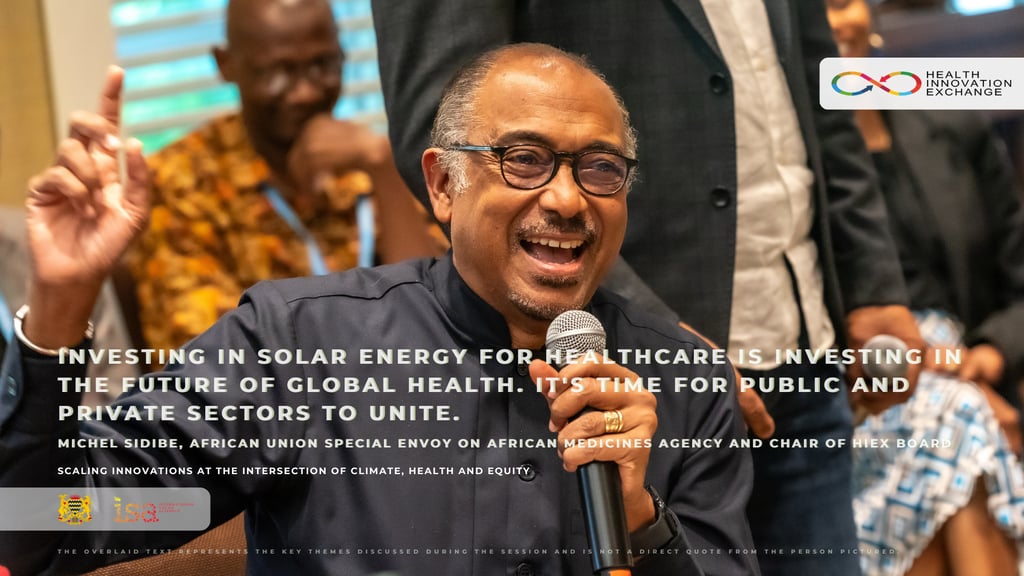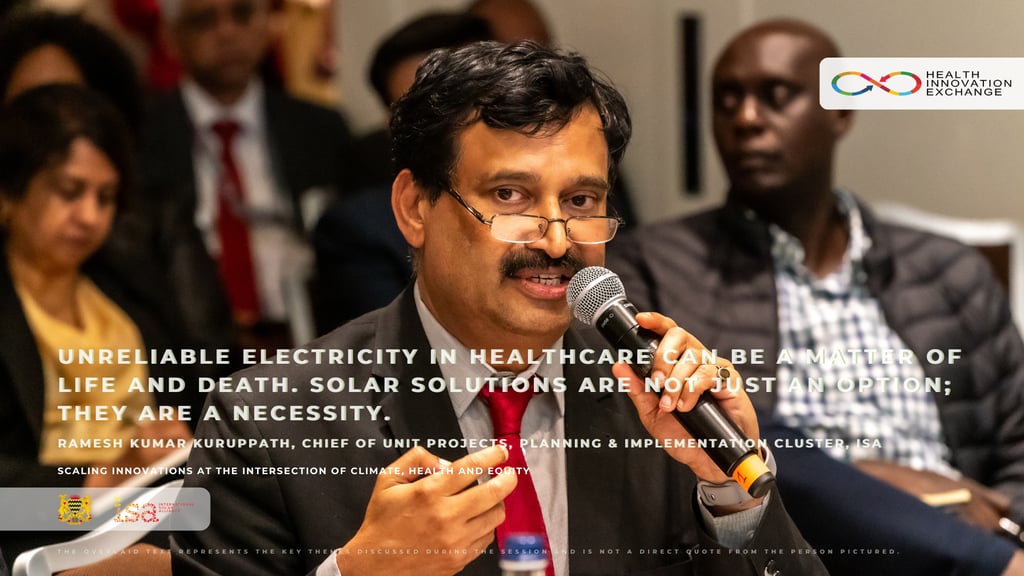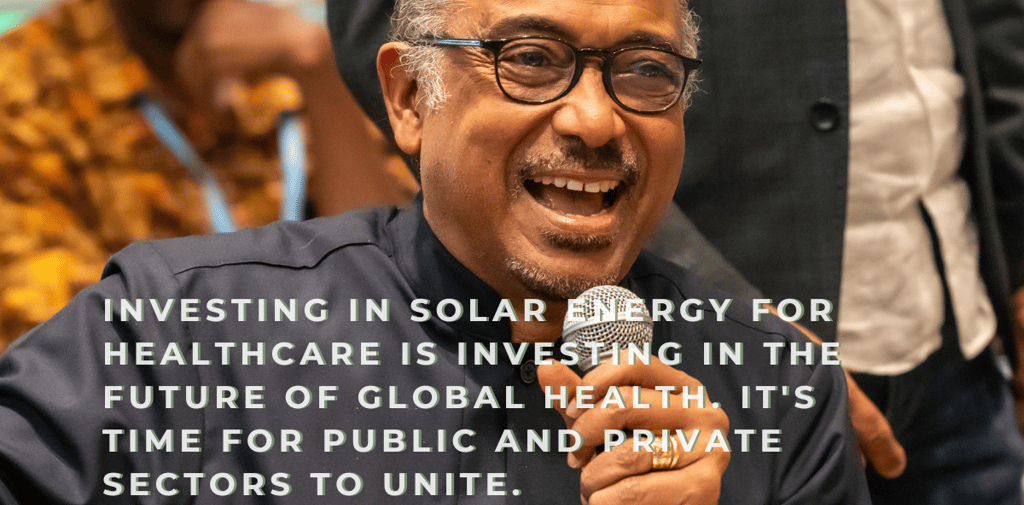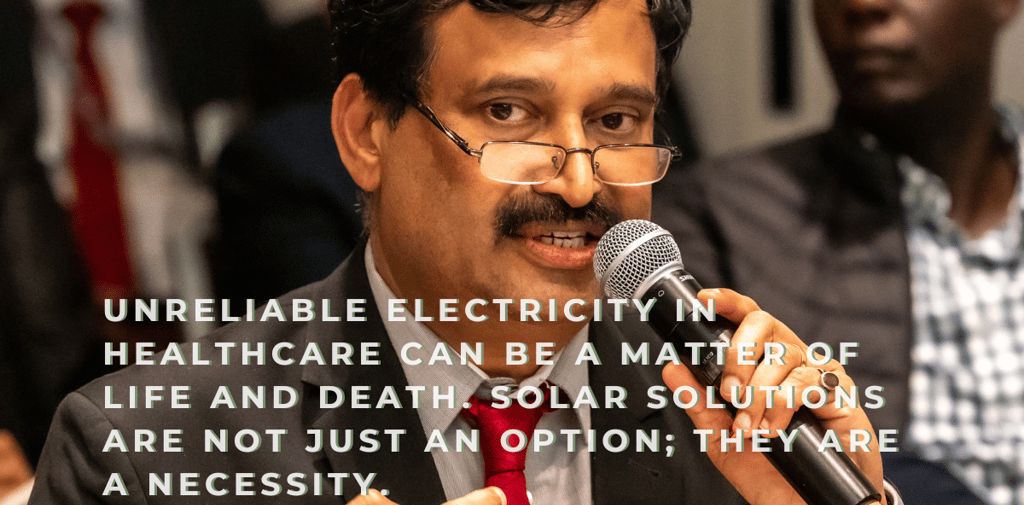
Building Investment Models for Solarising Health
The "Building Investment Models for Solarising Health" session emphasized the urgent need for reliable and sustainable energy solutions to improve health outcomes and ensure universal health coverage.
WHA77
4 min read
The session focused on addressing the critical issue of unreliable electricity in healthcare, which hampers access to quality healthcare services. The discussion highlighted the transformative potential of solar solutions in improving healthcare access, especially in last-mile areas and during pandemics. The roundtable brought together ministers and investors from multilateral and private sectors to explore investment models that can scale access to electricity for healthcare.
Key Themes and Discussions
Impact of Unreliable Electricity on Healthcare: The lack of reliable electricity is a significant barrier to effective healthcare delivery. Interruptions in power supply can have severe consequences, such as during surgical operations or in neonatal care units where power cuts can endanger lives. Speakers emphasized the dire need for stable energy solutions to ensure uninterrupted healthcare services, particularly in critical areas like operating rooms and intensive care units.
Innovative Solar Solutions: Solar energy presents a viable and sustainable solution to the electricity challenges faced by healthcare facilities in low-resource settings. Solar solutions not only provide a reliable power source but also contribute to reducing the carbon footprint of healthcare facilities. Examples of successful implementation of solar energy in healthcare were shared, showcasing the positive impact on service delivery and patient outcomes.
Investment Models and Financing: The session explored various investment models to finance the solarisation of health facilities. This included public-private partnerships, grants, and innovative financing mechanisms that can attract both public and private investments. Participants discussed the importance of creating a conducive investment environment that encourages the flow of funds into sustainable energy projects for healthcare.
Collaborative Efforts and Partnerships: The role of collaboration between governments, the private sector, and international organizations was highlighted as crucial for scaling solar solutions in healthcare. Joint efforts can lead to more efficient and widespread implementation of solar projects. Case studies of successful partnerships were presented, illustrating the benefits of collaborative approaches in achieving sustainable energy goals in healthcare.





The session focused on addressing the critical issue of unreliable electricity in healthcare, which hampers access to quality healthcare services. The discussion highlighted the transformative potential of solar solutions in improving healthcare access, especially in last-mile areas and during pandemics. The roundtable brought together ministers and investors from multilateral and private sectors to explore investment models that can scale access to electricity for healthcare.
Key Themes and Discussions
Impact of Unreliable Electricity on Healthcare: The lack of reliable electricity is a significant barrier to effective healthcare delivery. Interruptions in power supply can have severe consequences, such as during surgical operations or in neonatal care units where power cuts can endanger lives. Speakers emphasized the dire need for stable energy solutions to ensure uninterrupted healthcare services, particularly in critical areas like operating rooms and intensive care units.
Innovative Solar Solutions: Solar energy presents a viable and sustainable solution to the electricity challenges faced by healthcare facilities in low-resource settings. Solar solutions not only provide a reliable power source but also contribute to reducing the carbon footprint of healthcare facilities. Examples of successful implementation of solar energy in healthcare were shared, showcasing the positive impact on service delivery and patient outcomes.
Investment Models and Financing: The session explored various investment models to finance the solarisation of health facilities. This included public-private partnerships, grants, and innovative financing mechanisms that can attract both public and private investments. Participants discussed the importance of creating a conducive investment environment that encourages the flow of funds into sustainable energy projects for healthcare.
Collaborative Efforts and Partnerships: The role of collaboration between governments, the private sector, and international organizations was highlighted as crucial for scaling solar solutions in healthcare. Joint efforts can lead to more efficient and widespread implementation of solar projects. Case studies of successful partnerships were presented, illustrating the benefits of collaborative approaches in achieving sustainable energy goals in healthcare.





The session concluded with a strong call to action for stakeholders to prioritize investments in solar energy for healthcare. It emphasized that reliable electricity is essential for quality healthcare and that solar solutions offer a sustainable and effective means to achieve this. Participants were encouraged to leverage the insights and strategies discussed to drive impactful investments and foster collaborations that will enhance healthcare access and resilience globally.
You may view a video recap of the session here.
Key Takeaways and Recap Video















